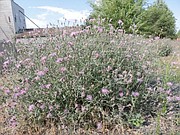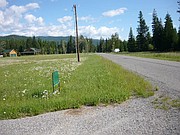Why is that white truck spraying along county roads and what is he using?
You may have seen a Boundary County truck out spraying roadsides and have wondered why? State law requires that Noxious Weeds be controlled. Idaho state statute title 22, chapter 24, list all the responsibilities of county governments and landowners. So, what is a noxious weed? Noxious is a legal term that the Idaho State Department of Agriculture (ISDA) uses to classify a plant that is considered to be injurious to public health, agriculture, recreation, wildlife, or property. The state has 67 weeds on the Noxious weed list. Boundary County has approximately 32 of these weeds. Noxious weeds are non-native invasive plants that came from other parts of the world. Some noxious weeds were brought to the United States as ornamentals, came in ship ballast water, packing material, or in seed mixes. When these plants were introduced here, they didn’t have their natural “predators” with them to keep the populations in control. These weeds outcompete the native species of plants. Weeds are typically spread by seed dispersal. The wind, water, animals, machinery, and people carry seed from one location to another. Some weeds can also spread from plant parts. It is estimated that Noxious Weeds cost Idahoans over $300 million dollars each year.
As part of Boundary Counties weed plan, county roadsides are sprayed. Roadsides are a hotbed for propagation of weeds. As the weeds, grows, flower, and produce seed along roadsides, they can be spread by tires and wind. One of Boundary counties biggest problem weeds is spotted knapweed. This plant can grow in poor soil, dry soil, wet soil, etc. It is a highly adaptive plant. One knapweed plant can produce over 2,400 seeds in its first year. By year four, over two million seeds, and by year 10, over five trillion seeds are produced. Spotted knapweed seeds can be viable for more than eight years in the soil. By controlling the weeds in roadsides native grasses are able to grow and thrive.
The current roadside spray plan is to spray county ROW’s (rights of way) every other year with spot treatments ongoing. County ROW’s are typically sprayed from road edge to six to eight feet. ROW’s are also sprayed to control weeds such as sweet clover and common tansy which can grow to heights that can impair the vision of drivers entering roadways.
So, now you know why the county is spraying, let’s talk about what products they are using. The county truck sprays approximately 25 gallons in one lane mile of road. In that 25 gallons we use only three ounces of a broadleaf herbicide called Opensight©, eight ounces of surfactant, and four ounces of a drift retardant. Opensight© is one of the eco-friendliest herbicides on the market. It is even labeled safe for lactating animals. The surfactant and drift control substances are basically modified vegetable oil concentrates which aid in weed control by making the herbicides adhere to the plant and are NPE free. Only broadleaved plants are controlled and grasses are not affected.
If you do not want the ROW sprayed in front of your property you must fill out a “no spray agreement” with the county before May 31. Forms may be picked up at the U of I extension office behind the courthouse or they are available online at www.boundarycountyid.org under the Noxious weed section. No spray signs that are county issued must be posted at each property corner along the roadway. If you chose to fill out this agreement you are responsible for the weed control in front of your property. If weeds aren’t controlled by July 15, the county may spray the ROW.
If you have any questions about weed control please contact Boundary County Weed Superintendent, Dave Wenk at 208-267-5341 or dwenk@boundarycountyid.org, the county website www.boundarycountyid.org or our Facebook page: Boundary County Noxious Weed Department has free information for noxious weed control. Remember … spread the word, not the weed!





